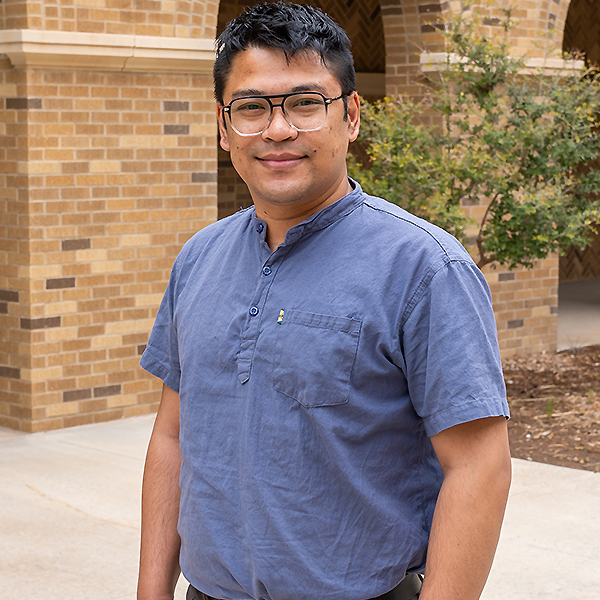
Rockson Karmacharya’s curiosity about diseases is leading him to explore ways to improve overall health in horses using a One Health approach.
As we celebrate Graduate Student Appreciation Week, meet Rockson Karmacharya who is in our innovative Ph.D. in One Health Sciences program. His passion to understand different types of diseases is making a difference in human, animal and ecosystem health. Let’s get to know Rockson more through a series of questions.
What are you passionate about in research and One Health?
I am passionate about finding the association and causation of disease along with the factors that drive the population (animals or humans) from the state of health to disease. After graduating from veterinary school from my home country of Nepal, I got a chance to work a lot with working horses. Colitis is a major cause of death in horses worldwide. We often find that the same pathogen present in different animals can kill some while others remain healthy. There might be some factors related to the animals or their microenvironment, or microbiome, that cause animals to drive them from health status to disease status.
What inspired you to pursue research?
After graduating from veterinary school, I worked in different sectors related to animal health, husbandry practices and welfare. While working with companion animals, I found the close interaction between humans and their pets. Similarly, while working with working horses in rural areas of Nepal, I found the interaction among human, livestock and their environment. The prevalence and persistence of disease in these places created a question in my mind, ‘What factor of animals or humans play a role in their status of being diseased or healthy?’
I also had the opportunity to spend a year at The University of Tokyo in Japan, as a research student in a Training Program for Asian Veterinarians II (TPFAV-II) which was organized by the Japan Veterinary Medical Association. While here I worked with students and faculty members finding answers to questions through research. Combining all my experiences I decided I wanted to further my career by finding answers to my questions through One Health research.
What is your research?
Colitis is a leading cause of death in horses worldwide. There is evidence of alteration in the microbiome of the hind gut in horses in gastrointestinal diseases such as colitis. Dr. Carolyn Arnold, my principal advisor at Texas Tech University’s School of Veterinary Medicine, has similar research interest in hindgut microbiome of horses.
We are working together to find and compare fecal microbiomes and metabolome of healthy and diseased animals. From this research we are aiming to find the drivers other than pathogens that contribute to health and disease status in horses.
What opportunities have helped you advance your research?
I have had many opportunities to work with students and faculty of different disciplines and gather knowledge about One Health from different perspectives. This type of collaboration is a big opportunity to carry out research here at the School of Veterinary Medicine.
Why did you choose Texas Tech to pursue your Ph.D. in One Health Sciences?
Even though I knew about One Health a long time ago, I felt its necessity and knew about its importance after I had several jobs involving animals. Texas Tech University is the first university to offer a Ph.D. program in One Health Sciences. The School of Veterinary Medicine is dedicated to a competence-based program and provides inclusiveness to various sectors linked to One Health. I was fascinated by the state-of-the-art laboratory facilities led by different experts of different fields. Knowing the importance of One Health, my research interest and the facilities and experts in Texas Tech, I decided to choose Texas Tech to pursue my Ph.D. in One Health Science.
What do you like most about the One Health Sciences Program?
This One Health Sciences program is so dynamic. It covers the sector of humans, animals, plants, food and the environment in which they live and interact. This program allows us to see experts from various fields like chemistry, veterinary science, food science, microbiology, virology, economics, epidemiology, and more come together to answer common problems of One Health. This program at Texas Tech also collaborates with different colleges and the Texas Tech University Health Sciences Center which helps the program be stronger and more dedicated towards One Health research.
How has the school helped you become a better researcher?
The school has provided me with other graduate students from different fields like veterinary science, pharmacology, food science, communication, and more where we can share various knowledge and experiences. On the other hand, the state-of-the-art laboratories have helped me in learning and conducting different experiments.
All the faculty members here are very friendly and provide time for any students to guide them on their research. The School’s Phi Zeta Research Day and seminars have helped us polish our presentation skills. There are also many interdisciplinary collaborations to maximize the resources and research outcomes.
The school is helping me put together my experience in the past, polishing my capabilities and molding my research.
What do you hope to do after graduating?
Since I knew the importance of One Health from personal experience, I want to find ways to promote One Health after graduation. I think it is very important that I help different sectors in health and wellbeing come together to address the common problems to make this world a better place to live in.
